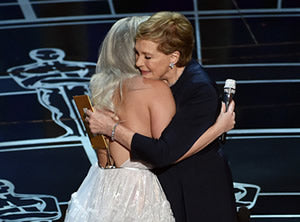Julie Andrews and the Moon Jupiter Conjuction
by Tony Howard
As a child of the 60s, I grew up on the The Sound of Music, which seems to have aired on TV at least once a year. Like many of you, I never grew tired of it, and looked forward to it every time (and still do!). The film’s release chart is of course, very interesting. But it is Julie Andrews’ lovely and memorable performance that provides the film’s backbone. Sure, the music is amazing. The cinematography and art direction is first-class. But just ask Carrie Underwood if the musical itself is a sure-fire recipe for success. (1) Unfortunately for Underwood, Julie Andrews emblazoned that character on our hearts and minds. And for good reason. With her natal Moon sextile Neptune and conjunct Jupiter, she was the perfect fit for this once-in-a-lifetime role embodying the Great Mother as an inspiration to generations of adoring fans.
Let’s explore the Moon-Jupiter conjunction in more detail by looking at Julie Andrews’ role in The Sound of Music. Through the magic of synchronicity, actors are often attracted to roles that embody the strongest aspects in their birthcharts, which lead to their most memorable performances. Andrews is no exception.
Jupiter has a reputation for being the planet of exuberant expansion, the Santa Claus planet dolling out good luck and blessings whenever it makes a harmonious aspect. Jupiter elevates whatever it touches, for better or worse. It is the planet that compels us to dream big, and reminds us to never underestimate ourselves.
How to Hear the Aspects Talking
 In this extended workshop-style webinar you’ll learn how to identify and interpret the major aspects and how they integrate into the larger context of the chart as a whole. We’ll talk about major and “minor” aspects, how to identify the most important aspect, and how to spot repeating patterns.
In this extended workshop-style webinar you’ll learn how to identify and interpret the major aspects and how they integrate into the larger context of the chart as a whole. We’ll talk about major and “minor” aspects, how to identify the most important aspect, and how to spot repeating patterns.
The Moon relates to healing, the divine feminine, the Great Mother. The Moon is also our conditioned self, expressing as those parts of us that are on autopilot, shaped by our experience of nurturing received (or not) during childhood. The Moon is associated with the oceanic tides, and women’s body cycles. So there seems to be a mysterious cosmic affinity between the two.
I have a natural impulse to qualify gender associations with planets by stating the obvious – that men can be nurturing and healing too. And we all have the moon in our birth chart. But at the same time, when we see the convergence of the mothering archetype and a female body, something magical happens. Maybe that has to do with the realities of birth. Carrying a child, giving birth, and breast-feeding are all experiences a male body can never have. As we strive towards valuing human diversity equally, let’s aim to value the masculine/feminine polarity equally. But let’s honor and be aware of their differences too.
As we start to blend these archetypes, we find the potential for the expansion of Great Mother energy. It can elevate and strengthen the sense of maternal caring. The moon can ground Jupiterian idealism in emotion. And Jupiter can influence the Moon to let one’s emotions get swept away in a tide of gushing optimism. With the Moon-Jupiter expressed literally, we see the happy woman, or the happy mother. We have the potential for a large family, or a gregarious family with high-minded values. We can see wealth or a large home.
In the story of The Sound of Music, the Moon-Jupiter connection floods the screen from opening scene, with the camera making sweeping panoramic gestures over the exquisite Austrian mountainside as Julie Andrews’ angelic voice heralds that now-famous melodic proclamation, “The hills are alive with the sounds of music.” Jupiter is the mountaintop and the expansive views. The song continues, “My heart wants to sing every song it hears.” The moon is the heart, the emotions. Jupiter with the Moon is the uplifting feelings conveyed in the song, aligned with the soaring, circling camera movements panning over the expansive landscape.
The Moon-Jupiter promises a special kind of emotional renewal. Our emotions are ever-changing. There are ups, yes. But there are downs too. And everything in between. With a Jupiter or Sagittarian connection to the Moon, we get regular reminders about the positive side of life. Our emotions don’t linger in the dumps for very long. It’s as if there is a constant nudging towards the upbeat. When things get rough, Moon-Jupiter folks remind us that there will be more good times to come. And that when we’re down, we can turn quickly shift our perspective with a little dose of gratitude. As Andrews sings:
I go to the hills when my heart is lonely
I know I will hear what I’ve heard before
My heart will be blessed with the sound of music
And I’ll sing once more
Andrews’ character Maria models this renewable positive outlook for her entire family through the darkest of challenges. But she starts by teaching the children that when they’re afraid, they can simply think of things they like to shift their mood. In the classic scene just before “My Favorite Things,” the youngest of the Von Trapp children find their way into Maria’s bedroom seeking comfort during a thunderstorm. It’s not long before one-by-one, every child in the house joins in, each one’s mother-radar accurately homing in on Maria’s natural capacity for care. But it’s not just care. If we have the Moon in Cancer without Jupiter, we can make a sad or frightened child feel warmly held and their feelings witnessed with healing nurturing. But the Moon with Jupiter will especially help elevate the child’s feelings, modeling the cup-half-full philosophy: “I simply remember my favorite things, and then I don’t feel so bad.”
We saw hints of Andrews Moon-Jupiter with her character Mary Poppins. But those qualities were fully realized in Maria, a character who faced real-world danger, not with magic, but with depth and skill. Andrews’ Moon and Jupiter in Scorpio are more suited to a dark challenge – in this case, from the Nazis during World War II. Jupiter here holds the promise of success, the narrow escape, and sheer luck.
Jupiter has the ability to crown king or queen whatever it touches. It bestows the “royal touch.” It can be aristocratic, and is associated with Zeus on top of Mount Olympus. With the Moon, we see the potential for a royal wedding, and the Moon expressed as Hera, the royal wife. In the last scenes of the film, which take place in a glorious cathedral – also Jupiter’s domain – we see Maria crowned Queen through her wedding to a wealthy aristocrat. But all of that is just pomp and fanfare. The crowning is really one of maternal victory – an emotional win. Skill at defeating the Nazis, successfully protecting “her” children, and emerging victorious and righteous.
During the film’s release, Neptune was conjunct Andrews’ Moon-Jupiter conjunction, facilitating a deep resonance between her character Maria and the collective consciousness. The connection was so deep that it has surely outlasted and outdone any projections of success the film’s creators could have imagined. One woman in Wales has seen the film a thousand times. (2) It has been re-released in theaters twice over the years, and has toured the indie-theater circuit for years as Sing-a-long Sound of Music, where audience members sing along with the cast during the film.
 In February 2015, Lady Gaga’s memorable vocal tribute to the film wowed audiences yet again but it was especially Andrews’ presence onstage after the performance that put the icing on the cake. In a scene that evoked royal and maternal grace, Lady Gaga showered gratitude on Andrews and they hugged – the moment awash in that jubilant, nurturing grace that Andrews conveys in such a special way. Or should I say, “In a most delightful way.”
In February 2015, Lady Gaga’s memorable vocal tribute to the film wowed audiences yet again but it was especially Andrews’ presence onstage after the performance that put the icing on the cake. In a scene that evoked royal and maternal grace, Lady Gaga showered gratitude on Andrews and they hugged – the moment awash in that jubilant, nurturing grace that Andrews conveys in such a special way. Or should I say, “In a most delightful way.”
Notes:
http://entertainment.time.com/2013/12/06/how-do-you-solve-a-problem-like-carrie-underwood/

Tony Howard graduated Summa Cum Laude in history and film from the University of Colorado. His degree turned out to be the perfect precursor to his career in astrology, where his focus includes historical research and chart analysis. His writing has been featured in The Mountain Astrologer and in two Flare anthologies: Astrology, the Next Generation and The Book of Music Horoscopes.
Tony has been researching declination since 2011 and specializes in “out of bounds” planets. He also loves working with and studying aspects, which forms the core of his work with clients. He is the founder of Astrology University.

